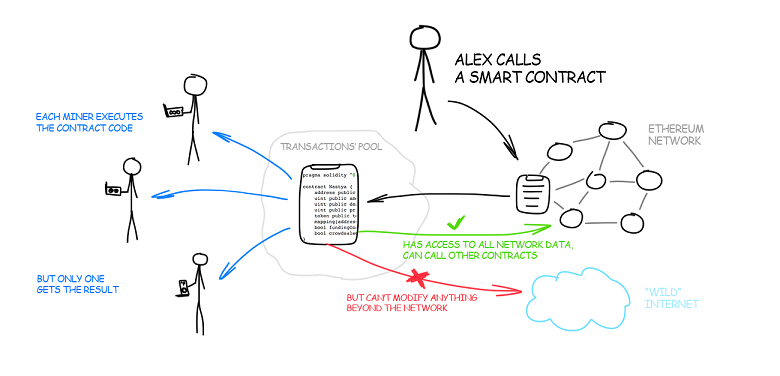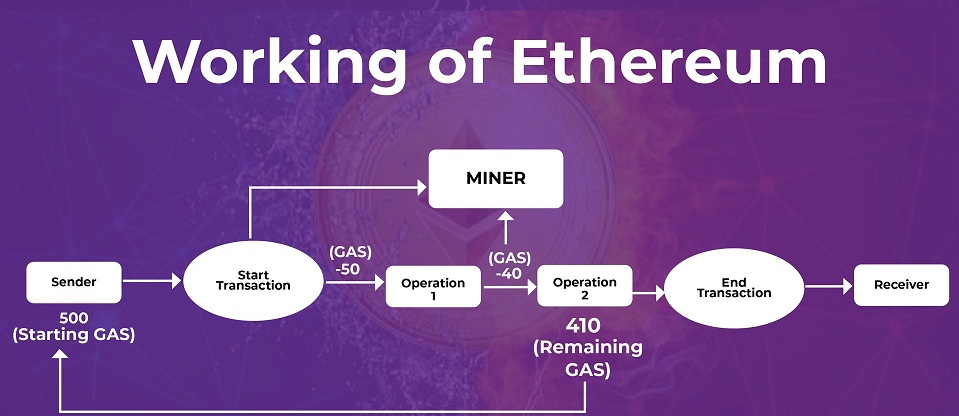The Ethereum FAQ section will help everyone to understand the key points, regarding one of the most popular cryptocurrencies in the world – Ethereum. As the two leading cryptocurrencies, based on market capitalization, Bitcoin and Ethereum are often referred to in the same context. It is not surprising that at first it is difficult for beginners to understand what Ethereum is and what is its special difference from Bitcoin.
Let’s consider the popular and most frequently asked questions on this topic.
Contents:
- Ethereum FAQ. What is ETH, what is it based on and file storage
- Ethereum cryptocurrency potential and opportunities
- Features of transactions. Answers from Ethereum FAQ
- Confidentiality and guarantees from Ethereum
1. Ethereum FAQ. What is ETH, what is it based on and file storage
1.1. What is Ethereum?
Ethereum — a decentralized smart contract platform, based on the Ether cryptocurrency.
1.2. What is Geth, Mist, Ethminer, Mix?
Geth: this is the Go implementation of the Ethereum node, which is the basis for any interactions with the Ethereum blockchain. Launching it locally will allow you to interact with the Ethereum blockchain easily.
Mist: This is the equivalent of a web browser, but for the Ethereum platform. It acts as a graphical interface for displaying the invoices and contracts that you interact with. It also allows you to create and interact with contracts in a graphical user interface without ever touching the command line. If you are not a developer and just want to store Ether and interact with Ethereum contracts, then Mist is the program to use. Downloads can be found on the Mist releases page.
Ethminer: standalone miner. This can be used for mining or mining testing. It is compatible with eth, geth and pyethereum.
Mix: an integrated development environment for developing DApp applications. Rapid prototyping and debugging of decentralized applications on the Ethereum platform.
| Geth | The Go implementation of the Ethereum node, which is the basis for any interactions with the Ethereum blockchain |
| ОMist | Equivalent to a web browser that acts as a graphical interface for displaying the invoices and contracts with which you interact |
| Ethminer | Standalone miner that can be used for mining or testing |
| Mix | Integrated development environment for developing DApp applications |
1.3. How can large files be stored on the blockchain?
Generally, you don’t want to store large files or chunks of data on the Ethereum blockchain due to the high storage cost. You will need to use a third party storage solution like Swarm or IPFS. Swarm is an Ethereum project for distributed file storage. IPFS is a non-Ethereum project with close ties to Ethereum; it will be used independently and in the future may be used as an additional layer underpinning Swarm.
1.4. Is Ethereum a Bitcoin-based?
Only in the sense that it uses the blockchain that first started, using Bitcoin. Ethereum has a separate blockchain that has several significant technical differences from the Bitcoin blockchain.
2. Ethereum cryptocurrency potential and opportunities
2.1. What is the future of Ethereum?
Ethereum developers plan to move from the Proof-of-Work consensus model to Proof-of-Stake in the future. They are also exploring scalable solutions and ways to store secrets on the blockchain.
2.2. What is the difference between an account and a wallet contract?
An account is your public or private key pair file that serves as your identification on the blockchain. A “wallet contract” is an Ethereum contract that protects your ETH and identity with features such as multi-signature signatures and programmed I/O limits. It can be easily created in the Mist Ethereum Wallet client interface.
2.3. Are the key files only accessible from the computer where you downloaded?
No, you can export or move the key file. Always remember to back up your key files yourself and know which computers you store your key file on.
2.4. How long does it take to download a blockchain?
The Ethereum blockchain is constantly growing and is approaching 10 GB as of March 2016. The time it takes to download depends on the number of peers you can connect to, the speed of your internet connection and other factors.
3. Features of transactions. Answers from Ethereum FAQ
3.1. How can I get a list of transactions from or to an address?
You would have to pull transactions from the blockchain to achieve this manually. Alternatively, you can rely on APIs from third party researchers such as Etherchain. However, you can filter the contract logs to achieve this for contract execution transactions.
3.2. Can the contract pay for its execution?
No, it is impossible. The enforcement gas must be provided to the address, making the enforcement request.
3.3. Can I sign a transaction offline and then send it to another online device?
Yes, you can refer to the solution from Icebox.
3.4. Can the transaction be submitted by a third party?
Technically yes, but there is an important limitation in contrast to transactions, signed with bitcoins: in ethereum, the transaction has a nonce. (More precisely, each account increments a counter when a transaction is sent, based on how many transactions were sent. If 3 transactions were ever sent from an account, the account nonce would be 3).
4. Confidentiality and guarantees from Ethereum
4.1. Can Ethereum contracts receive data, using third party APIs?
No, Ethereum contracts cannot receive data from external sources of information in this way. However, it is possible to transfer data from external sites (e.g. weather sites, stock prices) to Ethereum contracts through transactions. There are “oracle” services that are compatible with the Ethereum network, which deliver / send data to the Ethereum network for a fee.
4.2. Is the content of data and contracts sent over the Ethereum encrypted network?
Data and contracts on the Ethereum network are encrypted but not encrypted. Everyone can check the behavior of the contracts and the sent data to them. However, you can always encrypt data locally before transferring it to the network.
4.3. Can secrets or passwords be stored on the Ethereum network?
All data on Ethereum is publicly available. It is impossible to store secrets or passwords in Ethereum contracts unless everyone can see them.
4.4. ETH guarantee that the network can make more than 10,000 transactions / sec
Ethereum plans to implement a proof-of-interest change to the agreed protocol during the Serenity phase of its development roadmap. More information on the Ethereum PoS candidate and how he can increase the number of transactions per second can be found here.











